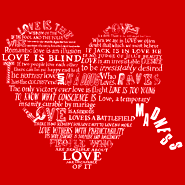Is romantic love a mental illness, as Plato said, a story that ends in death or the highest human achievement?
Sarah Vine and Tania Kindersley
 There are 21 dictionary definitions for the word love. Every woman may come to a point in her middle life when she suspects that she doesn't understand the first thing about any of these. Poets, philosophers, playwrights and pop singers from Socrates to Stevie Wonder have had a great deal to say about love.
There are 21 dictionary definitions for the word love. Every woman may come to a point in her middle life when she suspects that she doesn't understand the first thing about any of these. Poets, philosophers, playwrights and pop singers from Socrates to Stevie Wonder have had a great deal to say about love.
It is the sweetest thing; it is a red, red rose; it is a battlefield; it is a drug, a delusion, a lunacy. It is the answer, and the question. It is a balm, and a piercing arrow. H.L.Mencken compared it to perceptual anaesthesia; Keats wrote that it was his religion; Shakespeare called it a familiar, a devil, an ever-fixed mark, a smoke, a fire, a sea, a madness, a fever, a choking gall; it is like sunshine after rain, and does not bend.
Of the various loves, romantic love is the most complicated and inexplicable. It can come on when you least expect it (and with the most unsuitable person), it can cast you from the heights of ecstasy to the abyss of despair, it can roar in you one moment then dissipate as quickly as breath on glass. It is what drives you to offer yourself to another human for the rest of your natural life, but only a few years later you may look back and have no memory at all of that initial ecstasy. Romantic love can be so confusing that sometimes you simply want to give up on the whole thing and concentrate on the nature of dark matter, or macroeconomics, or something else less tiring.
A little biology can be helpful here. In the first throes of romantic love you are under the influence of a powerful chemical cocktail: dopamine (which makes opiates look like aspirin) is rushing through your veins. As if that were not enough, a perfect mixture of vasopressin and oxytocin, the attachment hormones, are raging around your body. Much of this was discovered through extensive study of prairie voles, who mate for life, spend a great deal of time tenderly grooming each other and nesting together, and studiously avoid meeting other potential partners.
If only all men were just like prairie voles, we say, but if wishes were horses we would all be Lady Godiva.
Aside from the chemical cosh, you also have the small-brain problem. MRI scans have shown that falling in love involves only a very tiny part of the brain, a much smaller part than is used when, say, operating heavy machinery. Researchers at University College London have remarked wryly that it was fascinating to reflect that Helen of Troy could have launched a thousand ships through the agency of such a limited expanse of cortex.
It is vital, therefore, to bear in mind that when falling in love and choosing your mate you may be making a decision about the rest of your life based on only a fraction of your cognitive function. This limited section of the brain is also the exact same part that responds to cocaine, which means that you may select a partner for life, move to Anchorage and decide to make many babies, all based on the same area of the cortex that enjoys an illegal substance that makes you talk accelerated gibberish all night long.
Plato said that love is a mental disease. Modern researchers agree enthusiastically, categorising love as a form of madness and echoing what psychologists have been telling tearful patients for years. (There are certain shrinks who refuse to treat people in the early throes of love because they are too insane to do a thing with.) Currently, scientists are having a genteel academic squabble over whether love most closely resembles the manic phase of bipolar disorder or the characteristics seen in obsessive compulsive disorder.
There is also a school of thought that insists love is a cultural phenomenon. As the great French cynic La Rochefoucauld said: “People would not fall in love if they had not heard love talked about.” The culture keeps up a rapid-fire bombardment of the power and the glory of romantic love, and yet it seems curious that so many of the Greatest Love Stories Ever Told - Cathy and Heathcliff, Tristan and Isolde, Heloise and Abelard, Lancelot and Guinevere - end in disaster, if not death and carnage. If we were being really sceptical, we might conclude that it is delusional that “in love” should be regarded as the greatest and most time-consuming aspiration of the modern female.












